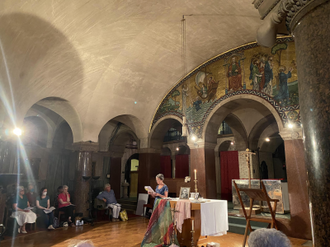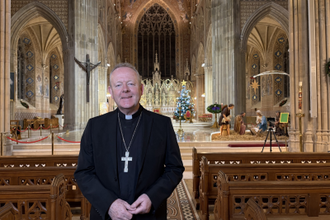Text: Pat Gaffney at Franz Jägerstätter Commemoration Service

Pat Gaffney at the service. Image: ICN/JS
Pat Gaffney gave the following reflection at the annual Franz Jägerstätter Commemoration Service held in Westminster yesterday, 9 August 2022. Here she refers to a message sent by Pope Francis to young people in Europe in which he challenges them to think about war and war in Ukraine especially, using Franz as model.
Clearly, Pope Francis had Franz and Franziska Jägerstätter in mind when he wrote to those young people in Europe. So young when they married, she was 23 and he was 29, they most certainly looked 'upwards and beyond' to seek the meaning of their life. And to seek out the truth about where their country, and as a consequence, their own lives were going. How did they get to that difficult place in August 1943 place and what carried them through?
The more I read and reflect on their letters in particular, the more questions I have. Yet a conversation that would enter more deeply into their relationship, their motivation, is just not possible. I had the opportunity to meet Franziska twice, in 2003 and again in 2007, towards the end of her very long life. What stayed with me was her joy, her humour, her fidelity. Gifts that may have helped carry her through many tribulations.
They seem to have had a wisdom and maturity beyond their years - perhaps because of the hard-working rural environment they both came from. Survival and flourishing depended on working together, being in tune with one another. It was, I think, also because of their self-education, searching and discernment. Franz wrote to his godson in 1935: "A person who never reads will never be able to stand on his own two feet: he'll become a mere football to be kicked around by other people's opinions." We know too that Franziska was a youth leader, devout and seeking her own role in life as a Christian.
Their published letters, written between in 1940 and 1943 (the prison letters) reveal something of their attempts, to encourage and understand one another. His imprisonment in 1943 must have been a harsh blow to them both. In their correspondence they had to be somewhat guarded - they were writing midst a culture where both the state and the church supported National Socialism / Nazism.
We get a glimpse of this in the opening of a letter from written to Franziska in March 1943 : I advise you to say only one thing if someone asks you whether you agree with my decision not to fight. Honestly say how it has been most difficult for you. I believe that you cannot lighten things for me… I have not great terror before the lying and cheating of NS officials. If I did, I would not be sitting here. I want to save my life but not through lies. …they tried to trap me by means of trick questions and so make me once again into a soldier. It was not easy to stick with my decision. It may become even more difficult. But I trust in God to let me know if it would be better for me to do something different.
His time was running out. His 'no' decision was about to carry them both into a dark place.
Franziska replied: Writing to you now in your current situation makes me terribly sad.
To be sure we know that the loving God and his heavenly Mother will not spare from suffering even those who are pure and without sin. So we sinful human beings should not grumble when the suffering which God sends us becomes greater… We do God's will even when it brings sad news. We do God's will even when we do not understand it. I had still a small hope that you would change your decision during your trip to Enns because you have compassion for me and know that I cannot help being as I am.
Then, in a letter, written near their wedding anniversary, in April 1943, Franz wrote:
I look back and observe all the good fortune and the many graces that have come to us during these seven years, I see that many things often border on being miracles. If someone were to say to me that there is no God or God has no love for us, and, if I were to believe this, I would no longer understand what has happened to me. Dearest wife, if we should find ourselves anxious about the future, we must not forget the thought that God has preserved us and favoured us and will not abandon us, and we must not grow weary of our struggle for heaven.
I believe I can build further on your love and faithfulness. And if I should be cut off from this life before you are, look beyond the grave and know that I sat here not as a criminal.
Subsequent letters from Franziska focus on life on their farm and around St Radegund. Their three 'little darlings', their daughters, were always present. We read of the blossoming fruit garden or the cow giving birth. Questions are asked about how to sharpen a scythe, how much to pay for livestock. She also conveyed her deep worries, which must have caused Franz great distress: "The work is often too much for us. My lungs are weak, mother's feet are hurting. Sot it is, and yet there is always more work. I have terrifying anxiety about the grain harvest. Father can no longer bear the heat and work has become an issue… I could necessarily use you… if you could come home for at least four weeks! Fourteen to sixteen hours of work a day is no small thing… That peace comes soon is surely the wish of everyone."
Did these images of normal life console Franz? Did Franziska hope that they would distract him, transport him back to St Radegund? Did they tug at his heart and mind as he read between the lines at the hardship she/the family were facing? Perhaps it was a mixture of all of these things. He did write that the letters brought him joy.
Franz's last letter to Franziska was on the morning of his execution " I am deeply grateful for everything that you have done for me in my life, for all the love and sacrifices which you have shown me. I ask you once again to forgive me for everything I have made you suffer and feel hurt. You have surely been forgiven by me for everything. I ask everyone else, whom I at some time may have pained and hurt, to forgive me. …
After his execution Franziska's wrote to the prison chaplain, Fr Kreutzberg, who had accompanied Franz and corresponded with Franziska. Her words seem to convey her understanding of the witness and sacrifice Franz had made: "He was always concerned to follow the Commandments. So it was no great sin that he did not obey the state, and I hope that with God's help he surely will have reached his eternal goal."
Back to the letter of Francis: "… in cases like this, (the war in Ukraine) it is legitimate to rebel." Today, young people in Israel, Ethiopia, Russia, Ukraine, Colombia and beyond are resisting and saying no to war. Today, on this 79th anniversary of his execution, may the joint witness of Franz and Franziska remind us that rebellion is costly and requires discernment, accompaniment and support, for those taking moral stand against war and for those who are close to them. Today let us reflect on our own role in creating a loving supportive community and church that will share the burden and support nonviolent choices.
Extracts from letters taken from Franz Jägerstätter, Letters and Writings from Prison. Edited by Erna Putz. Orbis Books.
Pat Gaffney is former General Secretary of Pax Christi EW and a member of Catholic Nonviolence Initiative Executive Committee.


















